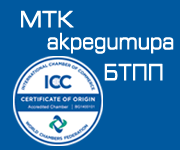Назад
Назад
BCCI on measures to fight grey economy
Over 40 shades of grey
According to some estimates informal economy in Bulgaria is 17%, while estimated by other methods the grey sector reaches up to 45%. I will only remind that there is no clear definition of “grey” economy, because there is a difference between a single violation in a company and a whole lot of violations not only of labour legislation, but also of ecological etc. laws, which result in a lot of unfair and uncompetitive advantages.
I will also remind that in a very old handbook published by BCCI, experts differentiate between 40 shades of “grey” only in the field of cotton processing and trade, which also affect the price. Therefore, when someone discusses the size and percentage of grey economy in Bulgaria, they should specify on what grounds the estimation is made, because often as a result of such opinions a negative picture of the Bulgarian business environment is painted.
I would like to say that we support the efforts of the Ministry of Economy to improve the economic climate in our country. Many of these ideas were proposed by the business and we are extremely glad to see them put to practice. However, I wish that more steps forwards were taken. Take for example the requirement of cost-covering approach to state fees and payments. The Revenue Agency collects revenues of significant value – about BGN 60 million a year. Meanwhile, expenditures for wages and equipment are only one third of this sum. The question is what happens to the remainder of it. Is it given as bonuses to employees or does it go in the state budget? This is not fair!
I will make a parallel with BCCI’s Voluntary Trade Register which works more quickly and at lower prices, without a break. 10 times more financial resources were spent for the state register, including from donations, but the business still cannot receive a perfect service. I would even go further by saying that if a company cannot be checked on line, this is water in the grey economy’s water-mill. After all, this is the purpose of the Trade Register – to provide access to anyone who would like to conduct a search, to check a future partner he is not familiar with. Therefore, there shouldn’t be any limitations and obstacles, including financial ones – even if you have to pay a certain fee, you should be able to enter the register and be sure with the received results. The law requires that companies entered in the register pay a certain fee and the information is available to everyone. This is the social purpose of any public register.
BCCI supports the measures taken by the Revenue Agency. In many cases, all these activities were suggested by the practice and by the businessmen themselves, because the existence of companies that don’t observe the legal requirements, thus receiving unfair advantage, is a huge burden for them. Some of these measures are related to higher expenses for companies, for example connecting the cash registers of gas stations to the NRA servers. We, at BCCI, try to explain to our members that in the long run these expenses will return to them, because they will guarantee a competitive environment and survival of the well-managed companies.
As far as tax administration is concerned we have a very serious remark. A lot of complaints from companies were received, claiming that tax inspectors spend too much time in the light sector because it is easier for them. Ordering multiple inspections of the same company means that one third of the accountants are engaged in servicing the tax inspectors. In our opinion this should no longer happen. BCCI would like to see the efforts of the tax administration concentrated on the so-called “grey” companies in all their shades, and it would be even better if they find the black ones. Such actions would be admired and applauded.
In conclusion, I would like to say that one of BCCI’s main functions is to work for Bulgarian economy and to make it lighter. That is why, in addition to the state register, we keep a voluntary register of companies with much stricter requirements. Due to it we have recently started working with sectorial organizations to create their own trade registers with additional criteria and requirements for companies. We have already established a Register of Contractors – construction entrepreneurs, with additional requirements, thus encouraging them to remain in the formal economy and guaranteeing more trust from their partners.
15.06.2011

 1 USD =
1 USD =  1 GBP =
1 GBP =  1 CHF =
1 CHF =  ISO 9001:2015
ISO 9001:2015




























